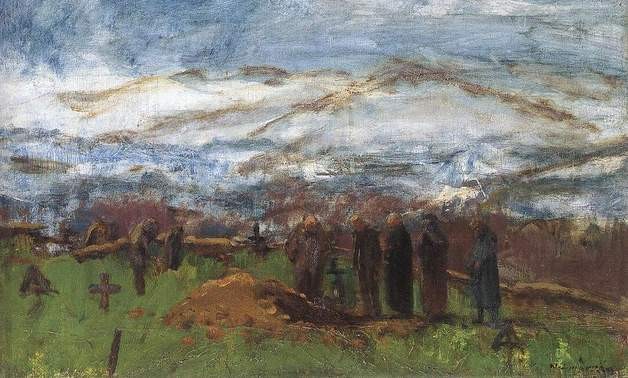Last week, many of the brothers attended the funeral service and burial of the sister of one of our brothers. Only a few months ago, it was discovered that she had a rare and aggressive form of cancer, which took her life last week at the young age of twenty-seven. At her burial, some of the brothers sang the beautiful hymn “Be Thou My Vision,” a favorite both of our brother and his sister. As we sang it, my mind turned back to my own father’s funeral three years ago, when many of the same brothers sang that same hymn. What makes this hymn a favorite of so many, and why does it seem to resonate so powerfully at funerals?
The tune Slane, like so many Irish folk melodies, has a simple and yet haunting beauty. Even more so, however, the text, written in Ireland in the eighth century and translated into English in the early twentieth century, has a timeless and universal appeal. The poem is clearly focused on God, not just in himself, but on our dwelling with him as the fulfillment of our lives. Consider the first verse, which begins:
Be Thou my vision, O Lord of my heart;
The words “vision” and “heart” refer to the two faculties that separate mankind from all other earthly creatures: mind and will. When we ask God to be our vision, we want him to fill our sight and our mind; we want to see him and know him entirely. When we call him Lord of our heart, we want him not only to be the ruler of our desires but also the object of our desires; we want to love him entirely. In this line, we speak directly to God and ask him to be exactly what he is: the fulfillment of those things that make us most fully human.
Naught be all else to me, save that Thou art.
If God fills our mind and will, then the only thing that really matters to us is that HE IS. This line recalls his name that he reveals to Moses in the burning bush: I AM WHO AM (Ex 3:14). For the Christian, who is passing through this life on the way to his homeland in heaven, all things must be referred to God, who is the foundation of them all. “All else” comes from God and should be “naught to us” except with regard to our return to him.
Thou my best Thought, by day or by night,
In his first letter to the Thessalonians, St. Paul exhorts us to “pray without ceasing” (5:17). When we pray, we focus the mind on God, who is our “best Thought,” and we do this without ceasing when we think about God “by day or by night.” Because St. Paul knows that our human minds must think about many things, however, he tells us in his letter to the Philippians that we should think about whatever is true, honorable, just, pure, lovely, gracious, excellent, or worthy of praise (4:8). If we are to have God as our best Thought at all times, if we truly desire that naught be all else to us, we must endeavor to keep our minds fixed on God and the things of God.
Waking or sleeping, Thy presence my light.
This line first repeats the emphasis on all times that is found in the previous line. While the previous line relates this constancy to thinking of and praying to God, this final line of the verse relates it to the light of God’s presence. His presence is the source of the light that allows us to see and think, but it is also what we most want to see and think about. His presence is constantly with us, providing light to our minds, but we must pray for the grace to think of and desire his presence by day or by night, waking or sleeping.
Our brother recounted at the funeral service the final conversation he had with his sister in person, in which she told him that it had only been in her time of suffering that she truly knew and felt the presence of Jesus and his love for her personally. When we or our loved ones are in the evening of life, when night is drawing nigh, we pray that we will ask Jesus to stay with us, as did the disciples on the road to Emmaus (Lk 24:29). We pray that his presence will be our light when all else is dark and that we will see him and love him and be with him for all eternity, for naught be all else to us, save the presence and vision of the Lord of our heart, our Savior, Jesus Christ.
✠
Image: Laszlo Mednyanszky, Burial in the Carpathian Mountains







